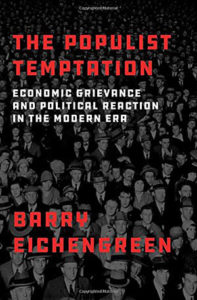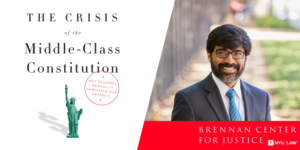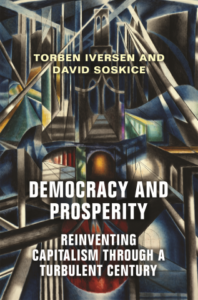 The emergence of authoritarian capitalism and illiberal populism is raising fresh questions about the relationship between democracy, predicated on political equality, and the market, a driver of socio-economic inequality. But it is the symbiotic nexus between democracy and capitalism which explains the “exceptional resilience” of the advanced democracies, a new analysis contends.
The emergence of authoritarian capitalism and illiberal populism is raising fresh questions about the relationship between democracy, predicated on political equality, and the market, a driver of socio-economic inequality. But it is the symbiotic nexus between democracy and capitalism which explains the “exceptional resilience” of the advanced democracies, a new analysis contends.
Countries like Russia and China are not simply authoritarian governments, and neither can their resurgence and assertion of power be interpreted as merely great power competition. The reason is that their economic systems integrate economic and political power, argues Ganesh Sitaraman, director of the Program on Law and Government at Vanderbilt University Law School.  Crony/state capitalism is not a bug, it is the central feature, he writes for War On The Rocks.
Crony/state capitalism is not a bug, it is the central feature, he writes for War On The Rocks.
In a global society, interrelationships weaponize economic power into political power, adds Sitaraman, the author of The Crisis of The Middle-Class Constitution.
In The Populist Temptation, Barry Eichengreen portrays the convulsions caused by populist agitators as a political reaction to economic grievances, Diogo Senra Rodeiro writes for the LSE’s Europp blog.
“Democracies become oligarchies when wealth is too concentrated,” according to the economist Emmanuel Saez,
Democracy can’t flourish in a context of grotesque concentration of wealth. This idea is neither new nor radical nor alien. It is old, mainstream and as American as Thomas Jefferson, adds Michael Tomasky editor of Democracy: A Journal of Ideas. Some will rejoin that many nations even more unequal than ours are still democracies — South Africa, Brazil, India. But are those the models to which we should aspire? Tomasky writes in The New York Times.
 Contrary to the argument advanced by analysts like Thomas Picketty that globalization and neoliberalism have weakened the advanced capitalist democratic state, democracy has paradoxically become strengthened through globalization, and “the spread of neoliberal ideas, reflects the demand of decisive voters to fuel economic growth, wealth, and opportunity in the emerging knowledge economy,” Torben Iversen and David Soskice conclude in Democracy and Prosperity: Reinventing Capitalism through a Turbulent Century.
Contrary to the argument advanced by analysts like Thomas Picketty that globalization and neoliberalism have weakened the advanced capitalist democratic state, democracy has paradoxically become strengthened through globalization, and “the spread of neoliberal ideas, reflects the demand of decisive voters to fuel economic growth, wealth, and opportunity in the emerging knowledge economy,” Torben Iversen and David Soskice conclude in Democracy and Prosperity: Reinventing Capitalism through a Turbulent Century.
“While the correlation between per capita income and democracy is well known (Lipset), and while the near-zero probability of rich democracies reverting to authoritarianism is well documented (Przeworksi and Limongi), why this is so continues to be a black box,” they note.
“[A]dvanced capitalist democracies evolve over time in response to technology and other shocks, and in turn reshape them; and they are embedded themselves in different electoral and legislative rules.”
Democracy and the advanced market economy are symbiotic, Iversen and Soskice argue in a thought-provoking thesis with three core elements, the FT’s Martin Wolf writes:
- First, the state is central. In an advanced economy, government needs to ensure companies are subject to competition, workers are co-operative, the population is adequately educated and trained, the research that drives technological advance is funded and the infrastructure on which the economy depends is built. ….
- Second, in an advanced economy, the educated and the aspirational are a large and highly politically engaged element in the population. Such people will tend to vote for parties and people they consider economically competent. …
- Finally, the skills on which advanced businesses (and so advanced economies) depend are embedded in networks of people who live in specific locations. Companies are, as a result, quite immobile. Only the less skilled parts of their operations are footloose.
 Their embeddedness in cosmopolitan cities, extensive education, diverse social contacts and so on make the new middle class more socially progressive than the old middle and lower classes, adds Sheri Berman, a professor of political science at Barnard College and author of Democracy and Dictatorship in Europe. From the Ancien Régime to the Present Day (and contributor to the NED’s Journal of Democracy).
Their embeddedness in cosmopolitan cities, extensive education, diverse social contacts and so on make the new middle class more socially progressive than the old middle and lower classes, adds Sheri Berman, a professor of political science at Barnard College and author of Democracy and Dictatorship in Europe. From the Ancien Régime to the Present Day (and contributor to the NED’s Journal of Democracy).
Iversen and Soskice reject the dominant tendency in analyses to focus on social attitudes or a ‘cultural backlash’ when trying to explain contemporary voting patterns or political trends, since such analyses miss the deeper structural causes of contemporary problems, she writes for Social Europe:
Herein lies the primary reason why the rising inequality accompanying the transformation of capitalism has not been effectively countered by increased redistribution: the old middle class is hostile to the poor and the rising middle class is uninterested in the plight of the declining middle class—it is the workings of the democratic system rather than the political power of capital that is to blame.

Iversen & Soskice reject the focus on ‘cultural backlash’
Iversen and Soskice’s analysis deepens understanding of what a successful modern economy is and how it relates to democracy. But it also raises three big questions, says the FT’s Martin Wolf:
- The first is whether the advanced countries are able to bind their populations together. At present, the chances seem poor, not least because the populist politics that the left-behind favour tends to make their actual plight worse…
- The second question is whether artificial intelligence might destroy the economic advantages of today’s localised networks of skilled human beings. In such a world, “Silicon Valley” or the “City of London” might become a network of machines that could be located anywhere. ….
- The third question is whether the people at the top of the income distribution might pull away decisively from everybody else. One risk is that they will be able to poison the competitive wellspring of advanced capitalism, through their ability to fund populist campaigns in the name of the “left behind”. Will they replace open and competitive capitalism with oligarchic, anti-competitive and rentier capitalism in which low productivity growth combines with inherited wealth to create a new aristocracy?
“Capitalism is indeed the best economic system, just as democracy is the best political one,” Wolf concludes. “The two have worked well together in advanced capitalist democracies for a long time, with each tempering the weaknesses and buttressing the strengths of the other. But an economy of perpetual growth is a fragile plant.”







